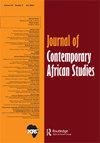The 21st Century and Challenges to the Nkrumah Independence Project
IF 0.8
Q2 AREA STUDIES
引用次数: 0
Abstract
Ghana’s historical place in the experience of global decolonisation as being the first British controlled African nation to win formal independence, has given the ideas of Kwame Nkrumah a prominent place in efforts to understand the challenges and possibilities of the post-colonial independence project. One of Nkrumah’s main contributions was his exposure of the mechanics of neo-colonialism in compromising the formal statehood of newly independent states. Given the transformed world-economy and the hegemonic ideology of neo-liberalism which has unfolded several decades after Nkrumah’s earliest reflections, this paper seeks to assess his validity for present efforts at sustaining post-colonial development and sovereignty. The central claim of this paper is that whilst Nkrumah’s warnings against neo-colonialism remain valid, both the specific challenges which he identified as well as the corrective proposals which he offered, have been negated by the new tactics and ideological assumptions of neo-liberal capitalism. The paper offers a balance sheet type assessment of the ongoing relevance of Nkrumah’s ideas, with a view to identifying the new challenges confronting the independence of formerly colonised states, and to renewing his political project in the present. These questions are explored in the context of the twenty-first century English-speaking Caribbean.21世纪和恩克鲁玛独立计划的挑战
加纳作为第一个在英国控制下赢得正式独立的非洲国家,在全球去殖民化的历史经验中占有重要地位,这使得Kwame Nkrumah的思想在理解后殖民独立项目的挑战和可能性方面占有重要地位。恩克鲁玛的主要贡献之一是他揭露了新殖民主义在损害新独立国家的正式国家地位方面的机制。在恩克鲁玛最早的思考之后的几十年里,世界经济的转型和新自由主义的霸权意识形态已经展开,本文试图评估他对当前维持后殖民发展和主权的努力的有效性。本文的中心主张是,虽然恩克鲁玛对新殖民主义的警告仍然有效,但他所确定的具体挑战以及他提出的纠正建议,都被新自由资本主义的新策略和意识形态假设所否定。本文对恩克鲁玛思想的持续相关性进行了资产负债表式的评估,以确定前殖民地国家独立所面临的新挑战,并在当前更新他的政治计划。这些问题是在二十一世纪英语加勒比地区的背景下探讨的。
本文章由计算机程序翻译,如有差异,请以英文原文为准。
求助全文
约1分钟内获得全文
求助全文
来源期刊

Journal of Contemporary African Studies
AREA STUDIES-
CiteScore
2.20
自引率
0.00%
发文量
18
期刊介绍:
Journal of Contemporary African Studies (JCAS) is an interdisciplinary journal seeking to promote an African-centred scholarly understanding of societies on the continent and their location within the global political economy. Its scope extends across a wide range of social science and humanities disciplines with topics covered including, but not limited to, culture, development, education, environmental questions, gender, government, labour, land, leadership, political economy politics, social movements, sociology of knowledge and welfare. JCAS welcomes contributions reviewing general trends in the academic literature with a specific focus on debates and developments in Africa as part of a broader aim of contributing towards the development of viable communities of African scholarship. The journal publishes original research articles, book reviews, notes from the field, debates, research reports and occasional review essays. It also publishes special issues and welcomes proposals for new topics. JCAS is published four times a year, in January, April, July and October.
 求助内容:
求助内容: 应助结果提醒方式:
应助结果提醒方式:


